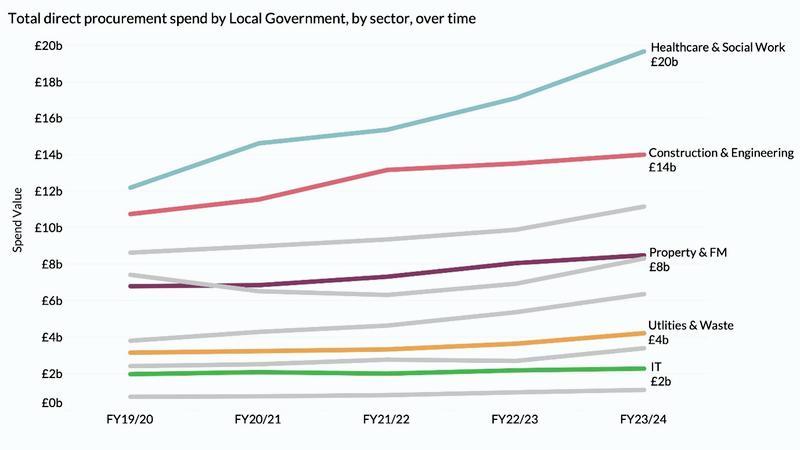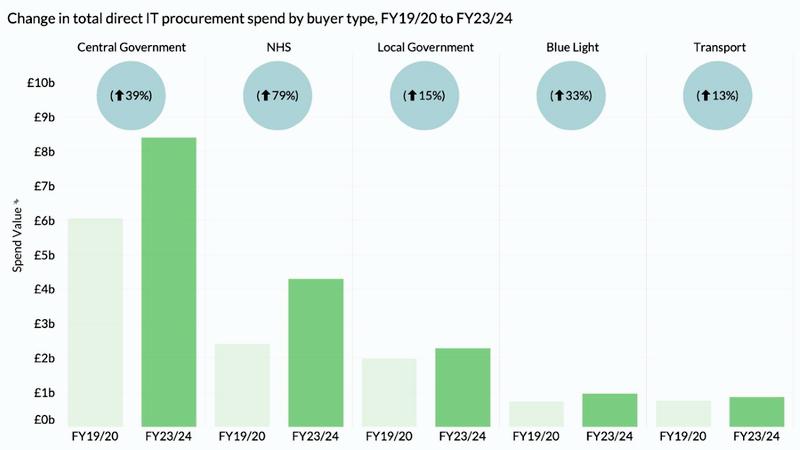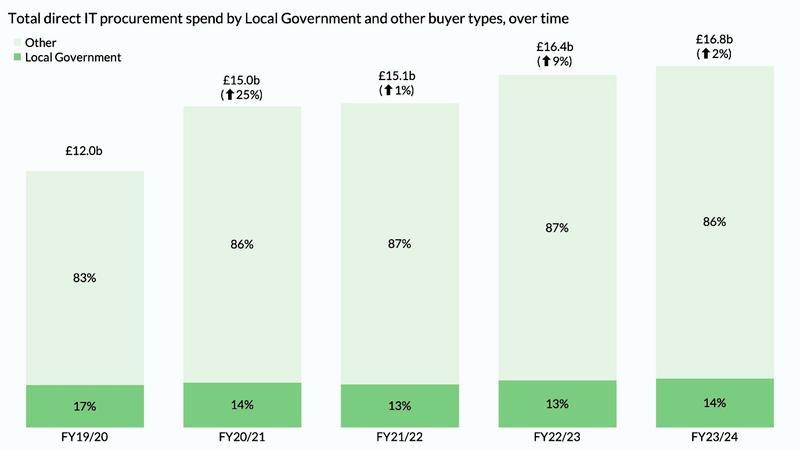Central Government updates
Sign-up to get the latest updates and opportunities from our Central Government programme.
To make the most of your techUK website experience, please login or register for your free account here.
Devolution offers a once-in-a-generation opportunity to transform services for local residents – and it cannot be seized without properly harnessing digital. But with local government’s digital investment flatlining, this unique moment risks slipping through the sector’s fingers….
A few months ago, I had the privilege of presenting at techUK’s annual Future Gazing Event: Where Next for Local GovTech in 2025? It was my second time speaking at this event. In previous years, discussions centered on groundbreaking technologies—AI, IoT, and other innovations poised to shape the future of local government. But this year was different.
As I listened to Gus Tugendhat from Tussell present his data, a stark reality set in. The concerns that many of us in the sector had long suspected were no longer just anecdotal—they were now backed by hard evidence. Local government is drastically underinvesting in technology, and this should be ringing the loudest of warning bells for policymakers in Whitehall. Below, I explore why this is a critical issue that demands urgent attention.
Local governments are the backbone of our communities. They provide essential services, maintain infrastructure, and ensure public safety. Yet, despite their critical role, local governments often contend with limited budgets, which forces them to make tough choices about which services to prioritise. One critical area that continues to be underfunded is technology. This is not a criticism towards local government. They are making gut retching decisions every day. But it is the reality, and it’s a problem because investing in digital transformation is not just necessary—it is essential for the long-term sustainability and efficiency of public services – we can see this from the Blueprint for Digital Government, published earlier this year and the importance placed on Local Government
The arguments for greater devolution in the UK closely align with those for increased investment in local government technology. Both emphasize the need for local authorities to have greater autonomy, resources, and flexibility to address the specific needs of their communities. Devolution allows local governments to make decisions that are more responsive and tailored to their regions, and digital investment ensures they have the technological capability to implement these decisions effectively. Without proper digital infrastructure, devolution’s potential benefits—such as greater efficiency, economic growth, and improved public services—are limited.
The modern world is increasingly reliant on digital solutions, yet many local governments lack the necessary resources to implement meaningful technological advancements. From cloud-based systems to AI-driven analytics, the right technology can significantly enhance service delivery, improve efficiency, and reduce long-term costs.
Research from Tussell (illustrated in the graph below) shows IT procurement remains to be but a small fraction of total local government expenditure. In fact over time, IT procurement has seen little to no growth in the last 5 years, despite notable growth in other areas like the expected healthcare and social work, but also in the less expected areas post covid in utilities, property and facilities management.

Our digital society is growing at an exponential rate. Just by one example, although the internet was invented 50 years ago, 90% of the worlds data was created in the last 2 years[1]. The same 2 years, local government has barely been able to invest in technology. And to put that into perspective, DSIT published data in January 2025, stating, ‘an average of £200 million in private sector investment has been funnelled into the UK’s world leading AI sector a day since the new government took office last summer – an average of more than £8.3 million every hour.’ The amount of data is expected to only grow, especially with the increase of IoT. Technology which will fundamentally re-shape local services in the future, when it is eventually adopted.
Devolution aims to bring government closer to the people, enabling more localized decision-making. But, this can only be successful if councils are equipped with modern digital tools to engage with residents effectively, analyse data to inform policy, and optimise service delivery. Without technology, the benefits of devolution—such as agility in governance, local economic growth and improved public trust—cannot be fully realised.
Local government account for the largest proportion of public sector procurement, surpassing even central government and the NHS. However, much of this procurement spending is increasingly absorbed by urgent demands in healthcare and social services, leaving fewer resources for other areas like digital transformation and IT infrastructure. Recent Tussell analysis shows that local government IT procurement has grown at a much slower rate than either central government or the NHS, raising concerns about the ability to modernise and improve efficiency in service delivery.
As shown in the graph below, central government IT procurement spend has increased 39% since 2019/20, compared to 70% for the NHS, 33% for Blue Light compared to only 15% by local government in the same time period.

While social care, homelessness services, and emergency support systems are critical, the persistent austerity measures mean that IT and other long-term investments are often deprioritised. Ironic, given how technology can fundamentally transform and improve these critical services. In a time when we should be spending more on technology to support and transform services, or indeed, transform government as whole, the share of total procurement spend is gradually falling.
Another way to look at this is about the equality of service development in our country. It is clearly uneven. While other parts of our public systems are receiving the funding they need for technological advancement, or more likely just ‘technology to keep their head above water,’ local government is the poor cousin left to drown without a life raft. As illustrated in the graph below, there has been some growth and investment in technology in public services overall, but for Local Authorities, their share of this has decreased over time from 17% to 14% of total procurement spend.

Without investment in digital transformation, local government risk falling behind, reducing their capacity to deliver services effectively in the long term.
Failing to invest in technology has serious consequences. Outdated systems lead to inefficiencies, security vulnerabilities, and increased costs over time. Additionally, a lack of digital investment limits local governments' ability to engage with residents, deliver essential services remotely, and leverage data analytics for informed decision-making. In contrast, regions that prioritise technology are better equipped to handle challenges such as public health crises, economic fluctuations, and rising citizen demands. They are also better equipped to pivot and respond when the next wave of technology advancements come.
Similarly, devolution without digital investment can result in fragmented and inefficient governance. Effective localised decision-making depends on high-quality data, seamless communication, and digital infrastructure that allows councils to implement policies swiftly and monitor outcomes. Technology is not just an enabler but a prerequisite for successful devolution.
To address this growing issue, Whitehall needs to enable local governments to prioritise digital investment in their budgets. This includes:
By aligning these investments with broader devolution efforts, local governments can create a more agile, effective, and empowered governance model that is truly responsive to the needs of their communities.
Underfunding local government technology is not a cost-saving measure—it is a short-sighted approach that leads to greater challenges down the road. Politically, it might be the “next guys’ problem”, but to society, it is our problem today. Investing in digital transformation is an investment in our future, ensuring that local governments can provide efficient, secure, and effective services to the communities they serve.
Local government is already behind the pace of technology and this is only going to increase over time. A failure to invest is a plan for failure. Communities risk falling behind in the digital age, the impact of this will only be magnified with devolution if technology is not part of the discussion, and so far… it’s not.
Similarly, devolution without adequate technological infrastructure will fail to deliver its promised benefits. If we truly want local governments to succeed in managing resources, driving economic growth, and improving services, we must provide them with the digital tools necessary to make that vision a reality.
Now is the time to advocate for increased funding in local government technology and digital transformation as a cornerstone of effective devolution.
Stronger local governments mean stronger communities. Let’s invest where it matters most!
[1] https://leftronic.com/blog/how-fast-is-technology-growing-statistics?
techUK drives public sector digital transformation by uniting the public sector and tech industry. Through early market engagement, efficient procurement, and innovative technology adoption, we help to modernise legacy IT, and enable efficient, secure, and personalised services.
Get involved: We run a busy calendar of activity including events, reports, and insights that demonstrate some of the most significant digital transformation opportunities for the sector. Our Transforming Public Services Hub is where you will find details of all upcoming activities. We also send a monthly public services newsletter to which you can subscribe here.
Sign-up to get the latest updates and opportunities from our Central Government programme.

Associate Director, Local Public Services, techUK

Associate Director, Local Public Services, techUK
Georgina is techUK’s Associate Director for Local Public Services
Georgina works with suppliers that are active or looking to break into the market as well as with local public services to create the conditions for meaningful transformation. techUK regularly bring together local public services and supplier community to horizon scan and explore how the technologies of today and tomorrow can help solve some of the most pressing problems our communities face and improve outcomes for our people and places.
Prior to techUK, Georgina worked for a public policy events company where she managed the policy briefing division and was responsible for generating new ideas for events that would add value to the public sector. Georgina worked across a number of portfolios from education, criminal justice, and health but had a particular interest in public sector transformation and technology. Georgina also led on developing relationships across central and local government.
If you’d like to learn more about techUK, or want to get involved, get in touch.

Associate Director, Central Government and Education, techUK

Associate Director, Central Government and Education, techUK
Heather is Associate Director, Central Government and Education at techUK, working to represent the tech supplier community to Central Government.
She started as Head of Central Government at techUK in April 2022 and was promoted to Associate Director in August 2025 supporting both the Central Government and Education programmes.
Prior to joining techUK in April 2022, Heather worked in the Economic Policy and Small States Section at the Commonwealth Secretariat. She led the organisation’s FinTech programme and worked to create an enabling environment for developing countries to take advantage of the socio-economic benefits of FinTech.
Before moving to the UK, Heather worked at the Office of the Prime Minister of The Bahamas and the Central Bank of The Bahamas.
Heather holds a Graduate Diploma in Law from BPP, a Masters in Public Administration (MPA) from LSE, and a BA in Economics and Sociology from Macalester College.

Associate Director, Defence and National Security, techUK

Associate Director, Defence and National Security, techUK
Fred is responsible for techUK's activities across the Defence and National Security sectors, working to provide members with access to key stakeholders across the Defence and National Security community. Before taking on the role of Associate Director for Defence and National Security, Fred joined techUK in 2018, working as the Programme Head for Defence at techUK, leading the organisation's engagement with the Ministry of Defence. Before joining techUK, he worked at ADS, the national trade association representing Aerospace, Defence, Security & Space companies in the UK.
Fred is responsible for techUK’s market engagement and policy development activities across the Defence and National Security sectors, working closely with various organisations within the Ministry of Defence, and across the wider National Security and Intelligence community. Fred works closely with many techUK member companies that have an interest in these sectors, and is responsible for the activities of techUK's senior Defence & Security Board. Working closely with techUK's Programme Head for Cyber Security, Fred oversees a broad range of activities for techUK members.
Outside of work, Fred's interests include football (a Watford FC fan) and skiing.

Senior Programme Manager, Education and EdTech, techUK

Senior Programme Manager, Education and EdTech, techUK
Austin leads techUK’s Education and EdTech programme, shaping strategies that support the digital transformation of schools, colleges, and universities. His work focuses on strengthening the UK’s education technology ecosystem, enhancing core technology foundations, and advancing the adoption of emerging technologies to improve educational outcomes.
Austin also chairs the EdTech Advisory Panel for AI in Education, contributing to national discussions on the future of EdTech, AI, and the UK's Education system.

Head of Health & Social Care, techUK

Head of Health & Social Care, techUK
Robert joined techUK in October 2022, where he is now Programme Manager for Health and Social Care.
Robert previously worked at the Pension Protection Fund, within the policy and public affairs team. Prior to this, he worked at the Scottish Parliament, advising politicians and industry stakeholders on a wide range of issues, including rural crime and health policies.
Robert has a degree in Politics and International Relations (MA Hons) from the University of Aberdeen, with a particular focus on strategic studies and energy security. Outside of work he enjoys activities such as running, rugby, boxing and cooking!
Senior Programme Manager, techUK
Senior Programme Manager, techUK
Raya Tsolova is a Programme Manager at techUK.
Prior to joining techUK, Raya worked in Business Development for an expert network firm within the institutional investment space. Before this Raya spent a year in industry working for a tech start-up in London as part of their Growth team which included the formation and development of a 'Let's Talk Tech' podcast and involvement in London Tech Week.
Raya has a degree in Politics and International Relations (Bsc Hons) from the University of Bath where she focused primarily on national security and counter-terrorism policies, centreing research on female-led terrorism and specific approaches to justice there.
Outside of work, Raya's interests include baking, spin classes and true-crime Netflix shows!

Senior Programme Manager - Justice & Emergency Services, techUK

Senior Programme Manager - Justice & Emergency Services, techUK
Cinzia joined techUK in August 2023 as the Justice and Emergency Services (JES) Programme Manager.
The JES programme represents suppliers, championing their interests in the blue light and criminal justice markets, whether they are established entities or newcomers seeking to establish their presence.
Prior to joining techUK, Cinzia worked in the third and public sectors, managing projects related to international trade and social inclusion.
Our members develop strong networks, build meaningful partnerships and grow their businesses as we all work together to create a thriving environment where industry, government and stakeholders come together to realise the positive outcomes tech can deliver.
